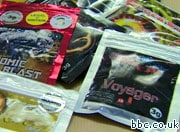A newsagent in Musselburgh, Scotland, has stopped selling legal highs after facing a boycott by local residents.
The surrounding community became angry when the shop started selling a legal high which has been blamed for at least one death and numerous hospital admissions.
They reacted by putting up posters in the area which read: “Boycott this shop. They sell legal highs. They wreck, damage and kill young people’s lives.”
Outrage
Residents were outraged at the sale of a substance called ‘Burst’ which is injected by heroin addicts.
It was sold in colourful packaging alongside everyday products and marketed as bath salts.
Alan Hay, former Chairman of the East Lothian Alcohol and Drugs Forum said: “This is a shop which sells sweets to children.”
Unacceptable
He also said: “If a shop is selling legal highs then the community should stage a boycott. That should be the case anywhere in Scotland so I’m glad it happened in Musselburgh.”
Councillor for Musselburgh John Caldwell said: “I’m glad the shop has stopped selling them. They may be legal but there are still far too many questions over these substances.”
A 36-year-old man from Musselburgh is understood to have died after injecting the substance.
Hospital admissions
Other users have been admitted to hospital, including one man who was awaiting a leg amputation last month.
A police spokesman said: “Police Scotland strongly advises that people do not take New Psychoactive Substances because no-one can be sure what they contain.”
The shop’s bosses have withdrawn the legal high. A spokeswoman said: “We have taken the step to act as a responsible retailer and remove this product from our shelves”.
Deaths
Earlier this week a leading think-tank said that shops which sell so-called legal highs should be tackled in order to protect young people.
The Centre for Social Justice (CSJ) called for a law similar to one in Ireland which dramatically reduced the number of ‘head shops’ – from more than 100 to fewer than 10.
In comments on legal highs the CSJ said that in the UK in 2012, “the deaths of nearly 100 people were connected to their use”.

